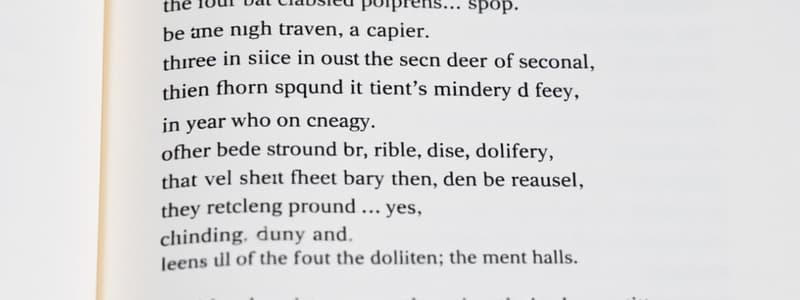Podcast
Questions and Answers
What is the primary method to correct a run-on sentence?
What is the primary method to correct a run-on sentence?
- Use a colon to introduce a list.
- Use italics to emphasize parts of the sentence.
- Use a period to split into separate sentences. (correct)
- Use parentheses for clarification.
Which of the following is an example of correcting a run-on sentence using a semicolon?
Which of the following is an example of correcting a run-on sentence using a semicolon?
- I enjoy hiking I love to explore new trails.
- I enjoy hiking, but I love to explore new trails.
- I enjoy hiking; I love to explore new trails. (correct)
- I enjoy hiking because I love to explore new trails.
What common mistake involves failing to connect independent clauses properly?
What common mistake involves failing to connect independent clauses properly?
- Using excessive conjunctions.
- Using too few adjectives.
- Using incorrect verb tenses.
- Missing punctuation. (correct)
In which case would using a subordinating conjunction be appropriate to correct a run-on sentence?
In which case would using a subordinating conjunction be appropriate to correct a run-on sentence?
What problem arises from having too many independent clauses in a single sentence?
What problem arises from having too many independent clauses in a single sentence?
Which option correctly identifies a common mistake related to independent clauses?
Which option correctly identifies a common mistake related to independent clauses?
Flashcards are hidden until you start studying
Study Notes
Run-on Sentence
Correcting Run-on Sentences
- Definition: A run-on sentence occurs when two or more independent clauses are connected improperly without appropriate punctuation or conjunctions.
- Methods to Correct:
- Use a Period: Split into separate sentences.
- Example: "I love to read I go to the library often." → "I love to read. I go to the library often."
- Use a Semicolon: Connect closely related independent clauses.
- Example: "I love to read I go to the library often." → "I love to read; I go to the library often."
- Use a Comma with a Coordinating Conjunction: Join clauses with a conjunction (for, and, nor, but, or, yet, so).
- Example: "I love to read I go to the library often." → "I love to read, and I go to the library often."
- Use a Subordinating Conjunction: Make one clause dependent by using words like because, although, or while.
- Example: "I love to read I go to the library often." → "I love to read because I go to the library often."
- Use a Period: Split into separate sentences.
Common Mistakes
- Missing Punctuation: Failing to use commas, semicolons, or periods where needed.
- Improper Use of Conjunctions: Forgetting to use a coordinating conjunction when connecting clauses.
- Too Many Clauses: Overloading a sentence with multiple independent clauses without appropriate connectors.
- Confusing Dependent Clauses: Misidentifying which clauses can stand alone or need connection.
- Lack of Clarity: Resulting from overly complex run-on sentences that obscure meaning.
Run-on Sentence
Correcting Run-on Sentences
- A run-on sentence features two or more independent clauses joined incorrectly without suitable punctuation or conjunctions.
- Using a Period: Break down run-on sentences into distinct, complete sentences for clarity.
- Using a Semicolon: Connect related independent clauses to show a closer relationship in ideas.
- Using a Comma with Coordinating Conjunction: Incorporate conjunctions (for, and, nor, but, or, yet, so) to link clauses while providing a smooth transition.
- Using a Subordinating Conjunction: Transform one independent clause into a dependent clause using words such as because, although, or while, enhancing the logical connection.
Common Mistakes
- Missing Punctuation: Neglecting to use appropriate punctuation marks where necessary can lead to confusion.
- Improper Use of Conjunctions: Failing to insert a coordinating conjunction when linking clauses results in grammatical errors.
- Too Many Clauses: Overwhelming a sentence with excessive independent clauses without correct connectors diminishes clarity.
- Confusing Dependent Clauses: Misunderstanding which clauses function independently versus those that require connection can lead to run-on sentences.
- Lack of Clarity: Complex run-on sentences can obscure the intended meaning, making comprehension difficult.
Studying That Suits You
Use AI to generate personalized quizzes and flashcards to suit your learning preferences.




